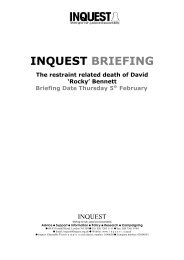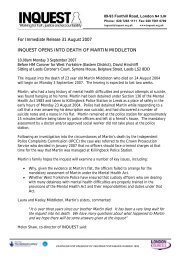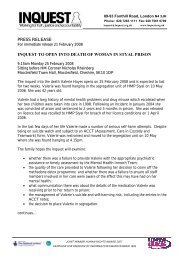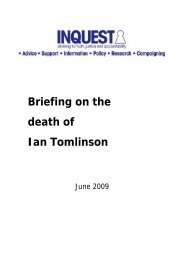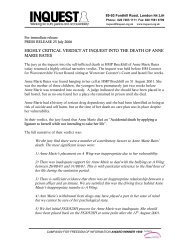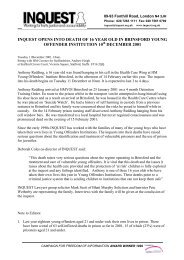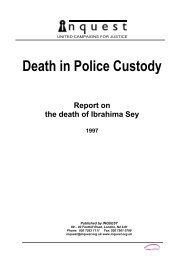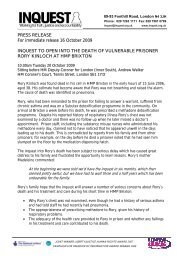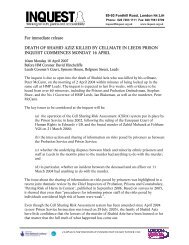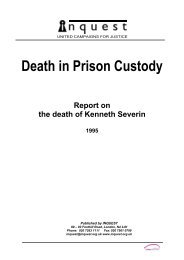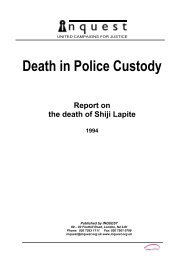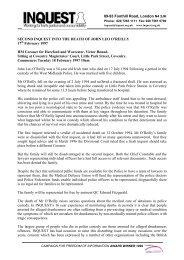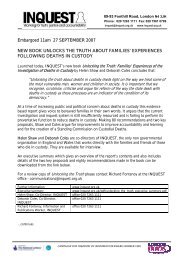Annual Report 2004 - Inquest
Annual Report 2004 - Inquest
Annual Report 2004 - Inquest
Create successful ePaper yourself
Turn your PDF publications into a flip-book with our unique Google optimized e-Paper software.
19<br />
deaths in prison in <strong>2004</strong>. Because of our concern about the<br />
number of deaths and the start of the project we were<br />
proactive in ensuring that our information reached those<br />
families that needed it and we have sent letters<br />
accompanying Information Packs via the prison service and<br />
coroner’s courts. As a direct result 17 of those families have<br />
contacted us and we are now working with them. Some of<br />
them are families of women who died in 2003 who had not<br />
previously been made aware by official sources of<br />
INQUEST’s service.<br />
The <strong>Inquest</strong> System<br />
Narrative verdicts<br />
INQUEST is monitoring all narrative verdicts returned at<br />
inquests following the Middleton case mentioned earlier in<br />
the report. This is an extremely useful resource for lawyers<br />
and others as there is no central official collation and<br />
monitoring of such verdicts. Many lawyers are unaware of<br />
the significance of the judgment and how it is being applied<br />
at inquests and the important contribution it can make in<br />
highlighting individual and systemic failings. This is an<br />
evolving area of inquest law and our monitoring of the<br />
verdicts should reveal its impact. Below are two examples<br />
of cases where narrative verdicts were returned.<br />
Anna Baker<br />
Anna Baker was the second of six women to die in a 12-<br />
month period at HMP Styal. Anna died in November 2002<br />
and the inquest into her death took place in November <strong>2004</strong>.<br />
Anna was on remand and was recognised as being at risk<br />
from suicide and self-harm. Anna was withdrawing from<br />
drugs. The day before her death she was moved from her<br />
shared cell to a single cell. The jury’s critical narrative verdict<br />
found the initial admission assessment into the prison was<br />
inadequate in light of Anna’s vulnerability and that there<br />
appeared to be a total lack of awareness and staff training in<br />
the management of her being at risk of suicide and self-harm.<br />
John Hinde<br />
Greater Manchester Police approached John Hinde’s vehicle<br />
which they had seen driving erratically and stop on a slip<br />
road of the M6 in Lancashire. During a struggle in which<br />
John was restrained in the prone position he lost<br />
consciousness. The officers were aware that John had<br />
concealed a package they believed to be illicit drugs in his<br />
mouth. The inquest heard evidence that the arresting<br />
officers, despite knowing that he was unconscious and in<br />
possible danger from the package in his mouth, failed to<br />
provide adequate first aid. The jury returned a critical<br />
narrative verdict highlighting concerns about the police<br />
officers’ treatment of John and in particular about the<br />
inadequacy of their first aid training and implementation of<br />
their own procedures.



